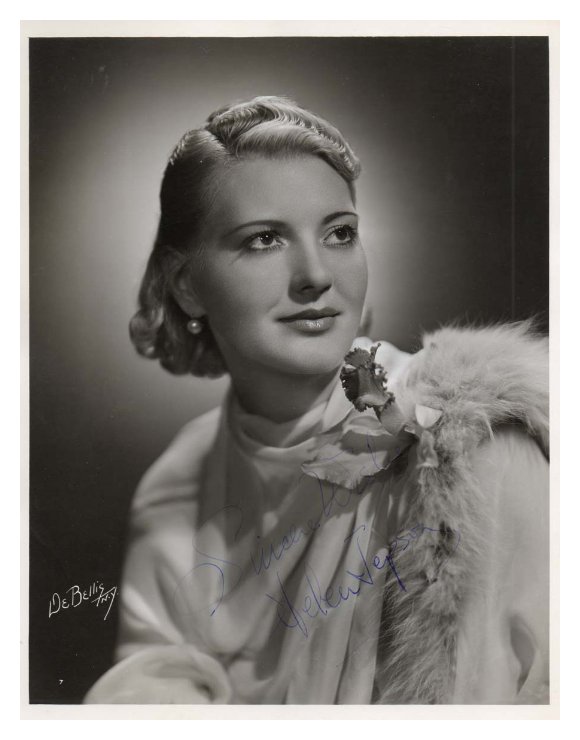

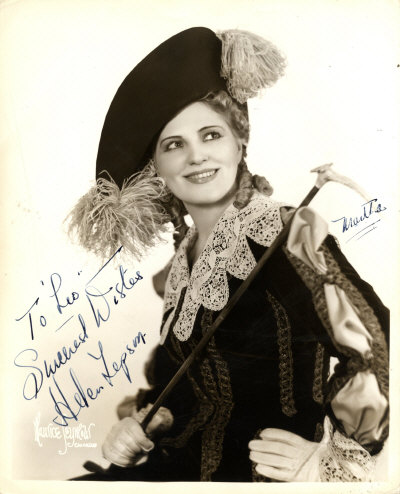 BD: Is that why you
went to Paris in 1936?
BD: Is that why you
went to Paris in 1936?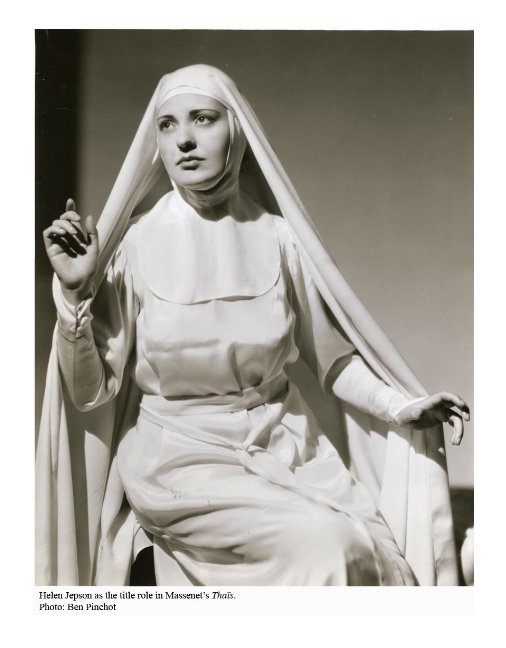 BD: Garden is
supposed to have said that the public liked her best in Thaïs because she wore fewest
clothes in that one.
BD: Garden is
supposed to have said that the public liked her best in Thaïs because she wore fewest
clothes in that one.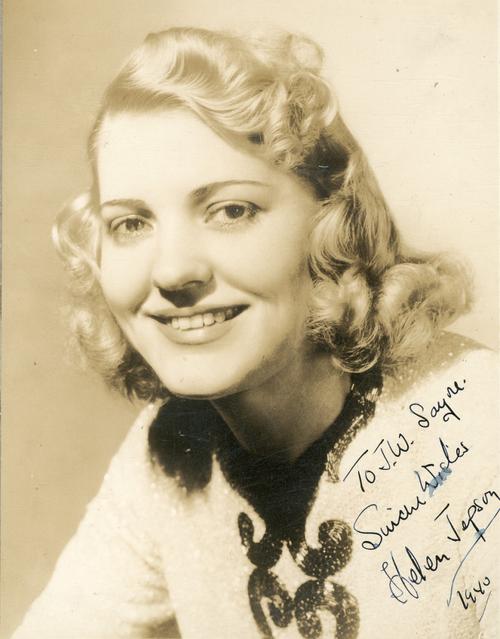 HJ: Yes, I
did. The only thing with Manon was that I didn't have the chance
to do it too many times. I loved the role, and did the arias on
concerts all the time. Bori was still at the Met and she did
Manon, and Sayão did the role, so I didn't have too many
opportunities. I did other roles much more. I did the movie
The Goldwyn Follies and I
played an opera singer. A man named Omar Khayam was the costume
designer. He asked if he could make some costumes for me, and he
made wonderful ones for Traviata
and Manon. You see, I
had all my own costumes. I went to Havana and Puerto Rico, and
you couldn't take the costumes away from the theater. You had to
have your own if you were traveling. Each theater would provide
them if you needed them, but I had my own costumes, my own jewelry, my
own wigs. I tried to have costumes similar to Bori. She was
known to have the most beautiful collection of costumes -- right down
to the little bags and shoes. But I was making a lot of money on
the radio and I did 60 concerts a year all around, so I spent money
like mad on costumes, and they were beautiful. I think that was
one of the reasons for my success because I certainly didn't have the
greatest voice. But it was a combination of everything --
costumes, personality, and I was slim in those days. Some of the
singers weren't . . .
HJ: Yes, I
did. The only thing with Manon was that I didn't have the chance
to do it too many times. I loved the role, and did the arias on
concerts all the time. Bori was still at the Met and she did
Manon, and Sayão did the role, so I didn't have too many
opportunities. I did other roles much more. I did the movie
The Goldwyn Follies and I
played an opera singer. A man named Omar Khayam was the costume
designer. He asked if he could make some costumes for me, and he
made wonderful ones for Traviata
and Manon. You see, I
had all my own costumes. I went to Havana and Puerto Rico, and
you couldn't take the costumes away from the theater. You had to
have your own if you were traveling. Each theater would provide
them if you needed them, but I had my own costumes, my own jewelry, my
own wigs. I tried to have costumes similar to Bori. She was
known to have the most beautiful collection of costumes -- right down
to the little bags and shoes. But I was making a lot of money on
the radio and I did 60 concerts a year all around, so I spent money
like mad on costumes, and they were beautiful. I think that was
one of the reasons for my success because I certainly didn't have the
greatest voice. But it was a combination of everything --
costumes, personality, and I was slim in those days. Some of the
singers weren't . . .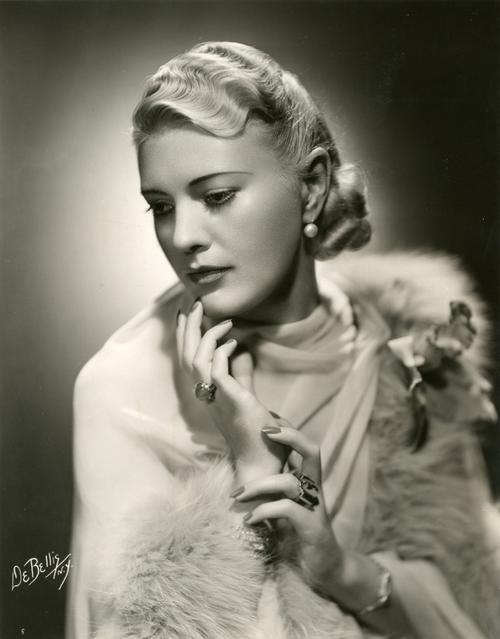 BD: Was there a
rivalry among the sopranos then -- you and Moore and Bori and
Sayão?
BD: Was there a
rivalry among the sopranos then -- you and Moore and Bori and
Sayão?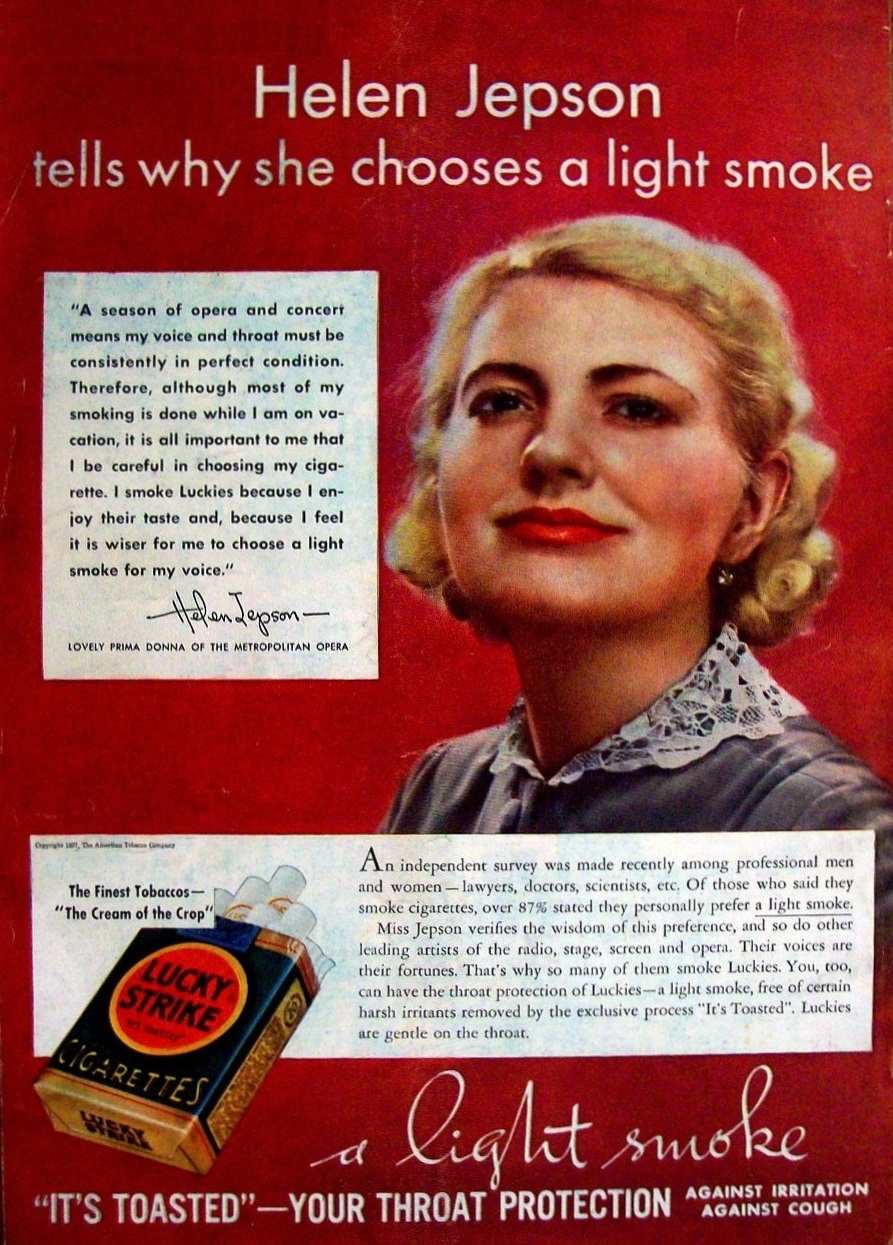
Obituary: Helen Jepson Tom Vallance, The Independent, Wednesday 24 September 1997 Helen Jepson, soprano: born Titusville, Pennsylvania 28 November 1904; twice married (one son, one daughter); died Bradenton, Florida 16 September 1997. The first singer to reach the Metropolitan Opera through the medium of radio, Helen Jepson was a lyric soprano with a dark-eyed, blonde-haired beauty that matched her charming voice. In the Thirties and Forties, American opera-goers were delighted to see a home-grown soprano alongside the more prominent European stars of the day, and she became a major attraction at the Met and other opera companies. She was the first soprano to record Gershwin's Porgy and Bess, had a starring role in the film The Goldwyn Follies (1938) and sang on radio with the bands of Paul Whiteman and Rudy Vallee, both of whom later claimed her as their discovery. In fact, the conductor Philip James first featured her with his Hamburger Symphony Orchestra on a local New Jersey broadcast in June 1933, months before she attracted the interest of those two gentlemen. Born in Titusville, Pennsylvania, in 1904, Jepson grew up in Akron, Ohio, where she studied voice and had leading roles in high-school productions of I Pagliacci, The Bohemian Girl and HMS Pinafore. She sold corsets and gramophone records to pay for tuition (also listening closely to records of Rosa Ponselle and other stars of the day) and won a scholarship to the Curtis Institute in Philadelphia. While a student, she sang with the Philadelphia Civic Opera and organised a summer troupe with three other singers. Calling themselves the Mississippi Misses, they travelled 6,000 miles in 12 weeks giving concerts in 87 towns. In 1930, after appearances with the Philadelphia Symphony Orchestra and the Civic Opera, she created a sensation playing Nedda in I Pagliacci with the Philadelphia Grand Opera. She stayed with the company for three seasons until its financial collapse in 1932. Moving to Manhattan with her husband, the flautist George Possell, she made her coast-to-coast radio debut singing "The Jewel Song" from Faust on Rudy Vallee's Fleischman Hour, on Columbus Day 1933 (after which Vallee referred to himself as her "Columbus"). Engaged to make weekly appearances on the Paul Whiteman show, she was voted Most Important New Air Personality of 1934. Her broadcasts attracted the attention of the Metropolitan and she made her debut with them on 24 January 1935 in the world premiere of Horatio Seymour's one-act opera In the Pasha's Garden. Starring the great baritone Lawrence Tibbett as a stern pasha who buries his wife's lover alive in a trunk (in which he had been hiding), it was a weak piece, but Jepson was acclaimed for her beauty, voice and charm. Violetta, Louise, Nedda, Melisande and Desdemona were among roles that followed, while she continued to get regular bookings on the radio on The Bell Telephone Hour, Your Hit Parade and other shows. On 10 October 1935 Porgy and Bess, the superb folk-opera by George and Ira Gershwin and DuBose Heyward, had its premiere in New York, and just four days later Jepson and Tibbett started recording its songs for Victor Records with the orchestra and chorus of the stage production. It was well known that George Gershwin had originally hoped that Tibbett might create the role of Porgy and the composer supervised the recordings, which have frequently been reissued and still impress. (The original leads, Todd Duncan and Anne Brown, eventually recorded their roles in 1940 for Decca.) Jepson made few other recordings, though she put her Desdemona on disc in an abridged 12-part version of Verdi's Otello (with Giovanni Martinelli as the Moor and Tibbett as Iago) in 1939. Two years earlier, Sam Goldwyn, planning a film extravaganza called The Goldwyn Follies (to rival on screen the stage revues of Ziegfeld), cast Jepson as one of the stars. The resultant melange of comedy acts, opera, ballet, jazz and popular music, linked by the wisp of a story, was an indigestible hodge-podge but there were some compensations, including luscious colour, songs by the Gershwins, and the preservation on film of Jepson singing "The Brindisi" from Verdi's La Traviata (with Charles Kullmann), Enrico Toselli's "La Serenata", a chorus of the Gershwins' "Love Walked In" (with Kenny Baker) and, best of all, a soaring "Sempre Libre" which winningly displayed her fine coloratura. Paramount announced that it would be signing Jepson to a contract for a string of filmed operettas, but, perhaps because other opera stars (including Tibbett) had failed to prove box-office draws, the plan fell through. Divorced in the early Forties and remarried (to Walter Dellera), Jepson continued to headline at the Met while doing concerts and broadcasts until a throat ailment forced her retirement in 1947. She became a voice teacher (one of her pupils was the future stage and television star Edie Adams), then returned to college in New Jersey to study speech therapy for handicapped children, taking up volunteer work in her local Cerebral Palsy Rehabilitation Centre. She continued to attend the opera regularly and was usually a guest attraction at the Met's special events, where she was always given an ovation befitting of one of the house's great sopranos. |
This interview was recorded on the telephone on April 13,
1985. Segments were used
(with recordings)
on WNIB later that year, and again in 1994. The
transcription was made published in the Massenet Newsletter in July of
1986. It was slightly re-edited, the photos were added and it was
posted on this
website early in 2014.
To see a full list (with links) of interviews which have been transcribed and posted on this website, click here.
Award - winning broadcaster Bruce Duffie was with WNIB, Classical 97 in Chicago from 1975 until its final moment as a classical station in February of 2001. His interviews have also appeared in various magazines and journals since 1980, and he now continues his broadcast series on WNUR-FM, as well as on Contemporary Classical Internet Radio.
You are invited to visit his website for more information about his work, including selected transcripts of other interviews, plus a full list of his guests. He would also like to call your attention to the photos and information about his grandfather, who was a pioneer in the automotive field more than a century ago. You may also send him E-Mail with comments, questions and suggestions.